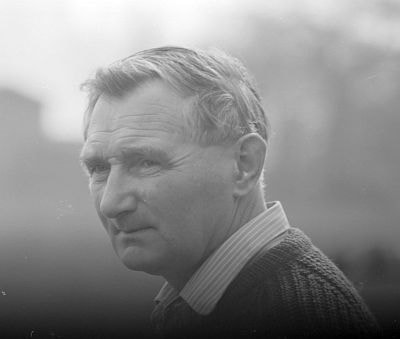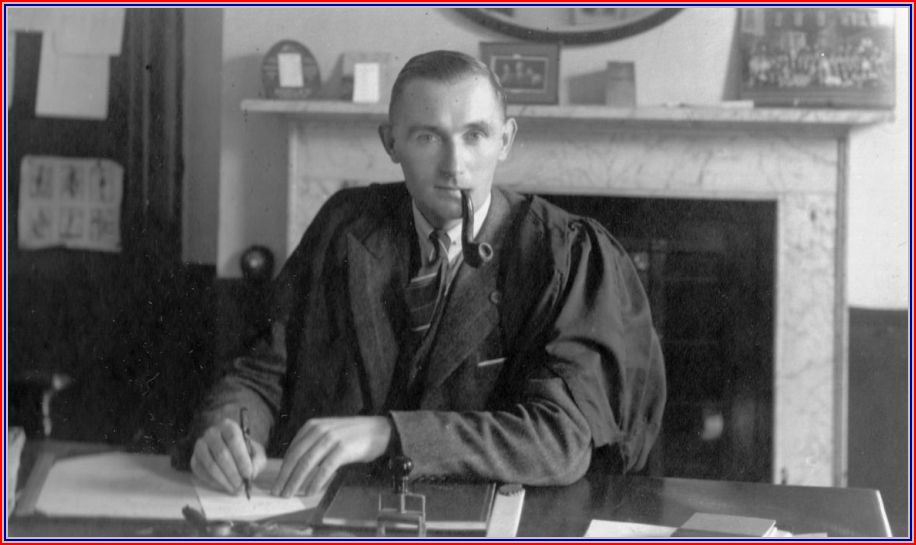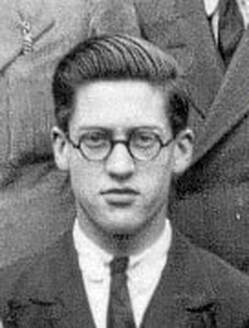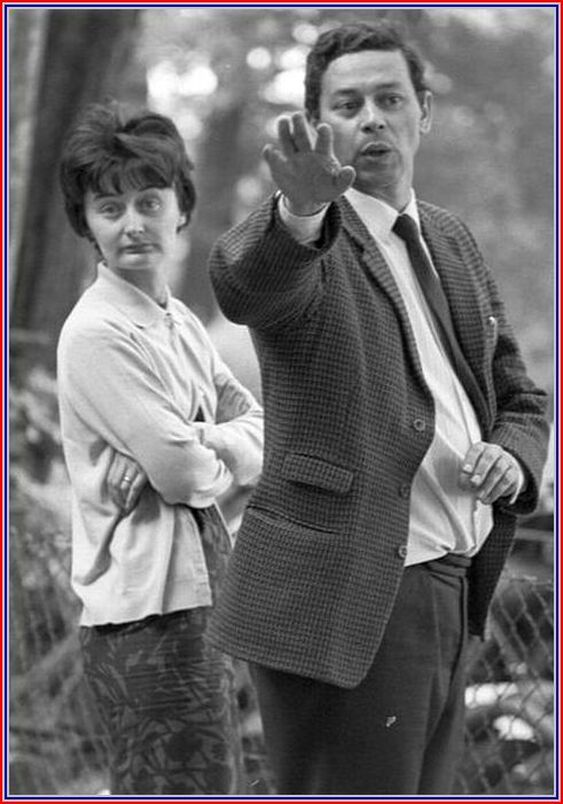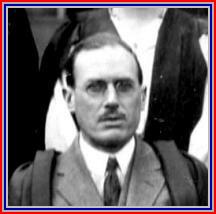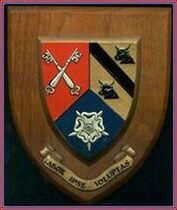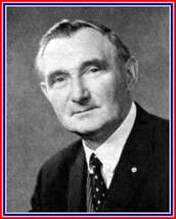Staff and Governors Index
About RWH:
He needed an inner determination applied over three decades to enable all of us to work and to achieve to the best of our abilities. This was not an easy task!
He needed an inner determination applied over three decades to enable all of us to work and to achieve to the best of our abilities. This was not an easy task!
Mr Hamilton in his office in 1940
Hello Dave,
I am just writing to congratulate you on the Hemsworth Grammar School site. I am researching my family tree and knew my great uncle, Russell Hamilton, was once headmaster of a school, but until recently did not know any more details. Through a genealogy website, I was able to get his teaching history and after doing a Google search on Hemsworth, was overjoyed at finding details and pictures of my great uncle. I did meet him but twice on visits to the UK in the late 1980’s and was struck by his warmth, kindness and intellect. To see photos of him as a young man and read about the school he spent so many of his years at brings tears to my eyes.
Congratulations on a wonderful site.
Regards
Lisa Smith
(August 2006)
I am just writing to congratulate you on the Hemsworth Grammar School site. I am researching my family tree and knew my great uncle, Russell Hamilton, was once headmaster of a school, but until recently did not know any more details. Through a genealogy website, I was able to get his teaching history and after doing a Google search on Hemsworth, was overjoyed at finding details and pictures of my great uncle. I did meet him but twice on visits to the UK in the late 1980’s and was struck by his warmth, kindness and intellect. To see photos of him as a young man and read about the school he spent so many of his years at brings tears to my eyes.
Congratulations on a wonderful site.
Regards
Lisa Smith
(August 2006)
Some long-serving members of Staff and Mr Absalom Flavell in May 1952
L-R: Miss Whitworth, Miss Carter, Miss Harris, Miss Smith, Mr Flavell, Mr Hamilton, Mr Collette, Mr Manning, Mr Leonard, Mr Atack, Mr Lock, Mr Farrar
Mr. Gabriel Price, M.P.
Chairman of the Governors. 1921 - 1934.
The sudden and tragic death of Mr. Price on March 24th. caused profound sensation throughout the district, and calls for special mention in the annals of that School with which he was so intimately connected.
There can be no question that but for Mr. Price there would have been no Secondary School in Hemsworth in 1921. And since its foundation in that year Hemsworth Grammar School has to thank Mr. Price, in a large measure, for its success. He has kept its claims and its requirements to the front at the meetings of the Education Committee and the County Council in Wakefield, so much so indeed that it came to be regarded as a red-letter day when Hemsworth Grammar School did not appear on the Agenda.
He took the keenest interest in the School's activities, and many a time he was heard to say that of all the public work which he performed there was none that gave him so much pleasure as his work in connection with this School. And who will forget his regular appearance on Parent 's Day year after year, and his captaincy of the Parent's Cricket Team, even though it meant perhaps a midnight dash to London afterwards?
His memory has been fittingly preserved in the School by the naming of Price House after him, and it is safe to predict that be will be known to future, as to past, and present, generations of girls and boys, as the founder and benefactor of Hemsworth Grammar School.
From the School Magazine 1934
Chairman of the Governors. 1921 - 1934.
The sudden and tragic death of Mr. Price on March 24th. caused profound sensation throughout the district, and calls for special mention in the annals of that School with which he was so intimately connected.
There can be no question that but for Mr. Price there would have been no Secondary School in Hemsworth in 1921. And since its foundation in that year Hemsworth Grammar School has to thank Mr. Price, in a large measure, for its success. He has kept its claims and its requirements to the front at the meetings of the Education Committee and the County Council in Wakefield, so much so indeed that it came to be regarded as a red-letter day when Hemsworth Grammar School did not appear on the Agenda.
He took the keenest interest in the School's activities, and many a time he was heard to say that of all the public work which he performed there was none that gave him so much pleasure as his work in connection with this School. And who will forget his regular appearance on Parent 's Day year after year, and his captaincy of the Parent's Cricket Team, even though it meant perhaps a midnight dash to London afterwards?
His memory has been fittingly preserved in the School by the naming of Price House after him, and it is safe to predict that be will be known to future, as to past, and present, generations of girls and boys, as the founder and benefactor of Hemsworth Grammar School.
From the School Magazine 1934
Mr Hamilton
The opening sentence of the School Magazine for the autumn term of 1937 reads: "Last term marked the end of the first chapter of the school's history." Major Jenkinson, the school's first Headmaster had retired in the July and Miss Griffiths, the Senior Mistress, died in the following month. Mr. R. W. Hamilton, whose death at the age of 92 was announced in November 1993, had come from Bishop Auckland to takeover the headmastership and Miss Shortridge replaced Miss Griffiths. Insofar as I was concerned the summer of that year marked another major change. Mr Jenkinson had informed me that I was to be the School's new Assistant Secretary and I realised that I would receive my first dictation as an employee from two equally new office holders.
The tall, young, begowned and very energetic former Senior Classics Master from Bishop Auckland, County Durham, settled in quickly. He took the school motto, 'Labor ipse voluptas' in his long stride - 'work with pleasure' was certainly his belief too. Initially there were very few surprises in store for his office staff but I well remember in that first term having to race down from the main building to the games field to interrupt the Upper versus Lower Sixth form rugby match to let the mud-spattered referee know that the Governors were assembling in his room for the term's meeting. R.W.H. enjoyed his sport, preferably in the thick of it. By the spring of 1938 he was having matches with two of South Kirkby and Ackworth's cricket teams and within twelve months he was captaining one of them. On several occasions he even dictated letters to me as I sat by his bedside when he was recovering from a sporting injury.
To keep track of his many duties Mr Hamilton kept a small, thick note-pad on his desk. Every job to be done was listed and numbered from 1 to 99 before recommencing at 1. Some of those notes were in English, a few in Latin and many in what was to me an absolutely unknown tongue. When the work was completed the note was crossed off. Twice a day the list was checked methodically to ensure that the day's commitments had been carried out. The school ran like clockwork.
Russell W. Hamilton's mighty signature, invariably written by means of an extremely broad-nibbed fountain pen, was precisely ten centimetres in length. The only time County Supplies in Wakefield telephoned Hemsworth 66 during my two years in the School Office was to query, respectfully and tentatively, the requisition we had submitted for the enormous signature stamp in readiness for the Head's first Speech Day in the Hippodrome in November 1937. Within a fortnight the gigantic stamp was supplied exactly as requested. In this, as in all other matters, R.W. Hamilton was as firm as a rock!
In those two opening years of his thirty year stay at the the Grammar School the new Headmaster took leading roles in both of the annual staff plays, "A Chinese Puzzle" and "The Mystery at Green Fingers". A few years earlier his predecessor had taken the title role in "One Hundred Years Old". Like Mr. Hamilton, Major Jenkinson lived to celebrate his ninetieth birthday and both got well on the way to their one hundredth.
Within a few months of his arrival in Hemsworth, Mr Hamilton, as a past President of the North-Eastern Esperanto League, arranged that one of the several talks which traditionally were given in the course of every year to the assembled school should he given by a leading figure in the Esperanto movement. Thereafter scores of booklets which outlined the international language were sold at the office door at twopence each. After several years of struggling to translate letters from, and compose letters to, French pen friends it was most heartening to find oneself, within a few months, corresponding with Hungary, Sweden, Iceland, Russia and Bulgaria.
A few time-table changes were made about the middle of Mr Hamilton's first term. In addition to sharing with Mr Scourfield the sixth Form Latin he took over two of the Lower Sixth's "free" periods for Esperanto and in the second term he began to teach the subject twice a week to the first form. The utility of the international language was soon seen in action when the Headmaster of Finland's largest Technical School and later an educationist from the Far East came to Hemsworth for several weeks to study British secondary school organisation and teaching methods. I have no idea whether either could speak any English. All their conversations with Mr Hamilton were in Esperanto. We found it all most exciting - a Finn (Sinjoro Vilki) and an Oriental (Sinjoro Kubo) in Hemsworth (most probably the very first!). During the summer holiday of 1933 Miss Walker, one of the French staff, was invited by the Headmaster to learn Esperanto herself in order that she too could participate in the teaching of that language to the September 1938 intake. I believe His Majesty's Inspectorate at some future date looked askance at the introduction of the subject into a grammar school.
The parting of our ways came at the end of July 1939. RWH's next six years at Hemsworth would be very different: within weeks he would be responsible for the conversion of the cellars into air raid shelters, for the digging of trenches near the games fields for staff and pupils who might find themselves outside the main building during a sudden air attack, and for the liaison with billeting officers dealing with many hundreds of evacuees from the Leeds area. The grammar School was the distribution point for all these bewildered children before they were dispersed throughout the district to what were effectively foster homes. The Headmaster was also responsible for the establishment of the Hemsworth and District unit of the Air Training Corps with himself as Commanding Officer.
As Headmaster he had the grim task of notifying staff and pupils of the steadily increasing toll of casualties amongst former pupils, initially mainly old boys of the years of Major Jenkinson's headship, then boys he himself had known so well. Before the conflict was over, lads who had been in the lower forms on his arrival in Hemsworth had made the supreme sacrifice. Over forty perished Old Hilmians served in every theatre of operations and, of course, their casualties were especially high amongst those who went into the Air Force. Some became fighter pilots and, most numerous of all, the bomber crewmen. Even ten years after hostilities ceased Mr Hamilton's first Secretary would finally succumb to the hardships he endured in the Sicilian campaign of 1943.
Looking back after over half a century that which one recalls most vividly about Russell Hamilton was his penetrating gaze, his almost piercing examination of the face of whoever was in conversation with him, be he or she a member of staff, a pupil or his own Secretary. Permanently he had an air of quiet, calm authority yet one knew that when he spoke it would he with a kindly voice whether in reply to a point raised or in giving his next instruction. It was this kindness and understanding that enabled me to write my shorthand in my notebook knowing that he would rarely begin the next sentence until he had seen me write each Pitman full stop. A classical scholar of his learning and eminence could have dictated his letters or his annual report for Speech Day at a much greater speed than my 80/90 words per minute. It is safe to say that when I was addressing Headmasters' Conferences north of the border in the 1970s, I did not have Thomas Arnold of Rugby nor F.W. Sanderson of Oundle nor Edward Thring of Uppingham in mind. I am sure I based my ideas of great headmastership on Arthur Jenkinson and his successor, Russell W. Hamilton, M.A., M.Litt. (Durham).
With the death of Russell Hamilton in Exmouth in November 1993 yet another chapter has closed.
(Written 4th January 1994)
The tall, young, begowned and very energetic former Senior Classics Master from Bishop Auckland, County Durham, settled in quickly. He took the school motto, 'Labor ipse voluptas' in his long stride - 'work with pleasure' was certainly his belief too. Initially there were very few surprises in store for his office staff but I well remember in that first term having to race down from the main building to the games field to interrupt the Upper versus Lower Sixth form rugby match to let the mud-spattered referee know that the Governors were assembling in his room for the term's meeting. R.W.H. enjoyed his sport, preferably in the thick of it. By the spring of 1938 he was having matches with two of South Kirkby and Ackworth's cricket teams and within twelve months he was captaining one of them. On several occasions he even dictated letters to me as I sat by his bedside when he was recovering from a sporting injury.
To keep track of his many duties Mr Hamilton kept a small, thick note-pad on his desk. Every job to be done was listed and numbered from 1 to 99 before recommencing at 1. Some of those notes were in English, a few in Latin and many in what was to me an absolutely unknown tongue. When the work was completed the note was crossed off. Twice a day the list was checked methodically to ensure that the day's commitments had been carried out. The school ran like clockwork.
Russell W. Hamilton's mighty signature, invariably written by means of an extremely broad-nibbed fountain pen, was precisely ten centimetres in length. The only time County Supplies in Wakefield telephoned Hemsworth 66 during my two years in the School Office was to query, respectfully and tentatively, the requisition we had submitted for the enormous signature stamp in readiness for the Head's first Speech Day in the Hippodrome in November 1937. Within a fortnight the gigantic stamp was supplied exactly as requested. In this, as in all other matters, R.W. Hamilton was as firm as a rock!
In those two opening years of his thirty year stay at the the Grammar School the new Headmaster took leading roles in both of the annual staff plays, "A Chinese Puzzle" and "The Mystery at Green Fingers". A few years earlier his predecessor had taken the title role in "One Hundred Years Old". Like Mr. Hamilton, Major Jenkinson lived to celebrate his ninetieth birthday and both got well on the way to their one hundredth.
Within a few months of his arrival in Hemsworth, Mr Hamilton, as a past President of the North-Eastern Esperanto League, arranged that one of the several talks which traditionally were given in the course of every year to the assembled school should he given by a leading figure in the Esperanto movement. Thereafter scores of booklets which outlined the international language were sold at the office door at twopence each. After several years of struggling to translate letters from, and compose letters to, French pen friends it was most heartening to find oneself, within a few months, corresponding with Hungary, Sweden, Iceland, Russia and Bulgaria.
A few time-table changes were made about the middle of Mr Hamilton's first term. In addition to sharing with Mr Scourfield the sixth Form Latin he took over two of the Lower Sixth's "free" periods for Esperanto and in the second term he began to teach the subject twice a week to the first form. The utility of the international language was soon seen in action when the Headmaster of Finland's largest Technical School and later an educationist from the Far East came to Hemsworth for several weeks to study British secondary school organisation and teaching methods. I have no idea whether either could speak any English. All their conversations with Mr Hamilton were in Esperanto. We found it all most exciting - a Finn (Sinjoro Vilki) and an Oriental (Sinjoro Kubo) in Hemsworth (most probably the very first!). During the summer holiday of 1933 Miss Walker, one of the French staff, was invited by the Headmaster to learn Esperanto herself in order that she too could participate in the teaching of that language to the September 1938 intake. I believe His Majesty's Inspectorate at some future date looked askance at the introduction of the subject into a grammar school.
The parting of our ways came at the end of July 1939. RWH's next six years at Hemsworth would be very different: within weeks he would be responsible for the conversion of the cellars into air raid shelters, for the digging of trenches near the games fields for staff and pupils who might find themselves outside the main building during a sudden air attack, and for the liaison with billeting officers dealing with many hundreds of evacuees from the Leeds area. The grammar School was the distribution point for all these bewildered children before they were dispersed throughout the district to what were effectively foster homes. The Headmaster was also responsible for the establishment of the Hemsworth and District unit of the Air Training Corps with himself as Commanding Officer.
As Headmaster he had the grim task of notifying staff and pupils of the steadily increasing toll of casualties amongst former pupils, initially mainly old boys of the years of Major Jenkinson's headship, then boys he himself had known so well. Before the conflict was over, lads who had been in the lower forms on his arrival in Hemsworth had made the supreme sacrifice. Over forty perished Old Hilmians served in every theatre of operations and, of course, their casualties were especially high amongst those who went into the Air Force. Some became fighter pilots and, most numerous of all, the bomber crewmen. Even ten years after hostilities ceased Mr Hamilton's first Secretary would finally succumb to the hardships he endured in the Sicilian campaign of 1943.
Looking back after over half a century that which one recalls most vividly about Russell Hamilton was his penetrating gaze, his almost piercing examination of the face of whoever was in conversation with him, be he or she a member of staff, a pupil or his own Secretary. Permanently he had an air of quiet, calm authority yet one knew that when he spoke it would he with a kindly voice whether in reply to a point raised or in giving his next instruction. It was this kindness and understanding that enabled me to write my shorthand in my notebook knowing that he would rarely begin the next sentence until he had seen me write each Pitman full stop. A classical scholar of his learning and eminence could have dictated his letters or his annual report for Speech Day at a much greater speed than my 80/90 words per minute. It is safe to say that when I was addressing Headmasters' Conferences north of the border in the 1970s, I did not have Thomas Arnold of Rugby nor F.W. Sanderson of Oundle nor Edward Thring of Uppingham in mind. I am sure I based my ideas of great headmastership on Arthur Jenkinson and his successor, Russell W. Hamilton, M.A., M.Litt. (Durham).
With the death of Russell Hamilton in Exmouth in November 1993 yet another chapter has closed.
(Written 4th January 1994)
The article above was written by:
W.G. Branford (Mr Hamilton's Secretary 1937-39)
W.G. Branford (Mr Hamilton's Secretary 1937-39)
Term after term we have had to say goodbye to very many members of staff, but twice only since the School was opened in 1921 have we said goodbye to the Head of the School. Mr. R. W. Hamilton was Headmaster of Hemsworth Grammar School from 1937 to 1967, and under his wise guidance and leadership the School grew in size and in reputation to its present strength. Great progress was made on the academic side of school life; sporting and cultural activities were increased, and the team work of Headmaster, Staff and pupils did indeed succeed in "putting Hemsworth on the map".
Not only was Mr. Hamilton an excellent organiser, but an able participant in all School activities. A good all-round games player, he excelled in Hockey and in Cricket, and captained Staff teams in countless matches. His example was an inspiration to all our teams. At the annual Folk Dancing Festival, he and Mrs. Hamilton always led the procession as pupils from all schools in the area took up their positions for the opening dance. Mr. Hamilton's talents were not, however, confined to the field of sport. Music he always encouraged; Drama was constantly to the fore, as was shown by the annual School and Staff plays; the establishment of Esperanto both as a Club subject and also as part of the curriculum was another of his many achievements. Nor was Social Welfare overlooked. With the Headmaster's encouragement, regular help was given to the Save The Children Fund, to the Lord Roberts Memorial Fund, and to other deserving causes, local, national, and international. Mr. Hamilton has left his mark on the School. During his long term of office, he "upheld its best traditions", and won the respect and affection of Staff and pupils. His retirement at Christmas 1967 was truly the end of an era.
We are proud to have this opportunity of paying our tribute to Mr. Hamilton, and of thanking him for all he has done for the School. To him and to Mrs. Hamilton we wish good health and happiness in the retirement they have so well earned.
School Magazine 1968
Not only was Mr. Hamilton an excellent organiser, but an able participant in all School activities. A good all-round games player, he excelled in Hockey and in Cricket, and captained Staff teams in countless matches. His example was an inspiration to all our teams. At the annual Folk Dancing Festival, he and Mrs. Hamilton always led the procession as pupils from all schools in the area took up their positions for the opening dance. Mr. Hamilton's talents were not, however, confined to the field of sport. Music he always encouraged; Drama was constantly to the fore, as was shown by the annual School and Staff plays; the establishment of Esperanto both as a Club subject and also as part of the curriculum was another of his many achievements. Nor was Social Welfare overlooked. With the Headmaster's encouragement, regular help was given to the Save The Children Fund, to the Lord Roberts Memorial Fund, and to other deserving causes, local, national, and international. Mr. Hamilton has left his mark on the School. During his long term of office, he "upheld its best traditions", and won the respect and affection of Staff and pupils. His retirement at Christmas 1967 was truly the end of an era.
We are proud to have this opportunity of paying our tribute to Mr. Hamilton, and of thanking him for all he has done for the School. To him and to Mrs. Hamilton we wish good health and happiness in the retirement they have so well earned.
School Magazine 1968
Mr and Mrs Tromans on duty?
Photo Batey
